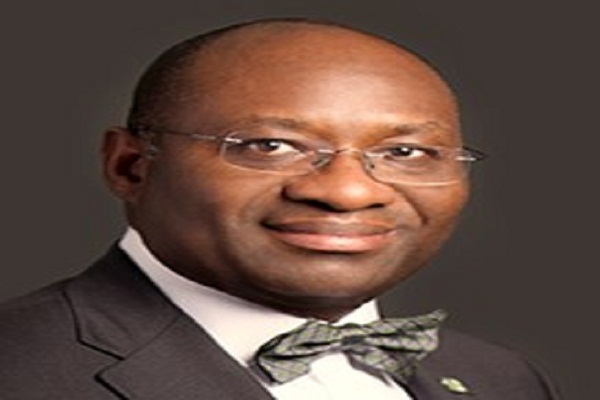E-Financial
COVID-19: SMEs’ Partnership, Rigorous Commitment Key to Sustainable Economy Growth- Sekibo

In light of the sharp dwindling in the global economy occasioned by Covid-19 pandemic, Ifie Sekibo, managing director/CEO, Heritage Bank Plc, disclosed that with partnership, truth, character and rigorous commitment to businesses, the micro, small and medium enterprises (MSMEs) stand to revamp the nation’s economy for sustainable growth.
He also stated that evidences have shown that for SMEs to continue to survive and remain the bedrock of any vibrant economy, the players must continuously reinvent themselves, complement each other, dream big, possess cutting edge ideas and think and rethink before venturing into businesses.
Speaking during a webinar session, a virtual conference platform at the Upgrade Summit 2020, on the theme, “Converting Ideas into Reality with Focus on SME’s” Sekibo emphasized the need for SMEs to look inward, learn and relearn, possess the spirit of self-sacrifice and believe, whilst advising that they must be bold and should not be afraid to fail because failing is not a failure and should not give up because they had failed.
According to him, most entrepreneurs burn with ideas but they need to mine them so that they could blossom, remarking that they need to have mentors that will enable them to achieve their goals and sell the ideas.
“Among small and medium-sized enterprises (SMEs) in Nigeria, there has been too much of an individual focus, rather than a holistic or intergenerational focus.
“There is not enough focus on partnership among Nigerian SMEs and this causes ventures to fail,” Sekibo stated.
Meanwhile, he reiterated that more needed to be done in the area of empowering entrepreneurship sector by the government and financial institutions because it is an agent of development.
On Heritage Bank’s efforts so far, the MD/CEO affirmed that its philosophy does not rely on traditional banking metrics like growth in the number of accounts, but according to him, “one of our major cardinal point as a bank is supporting micro, small and medium scale businesses and our strong desire to see young men and women succeed in any area of their business.
“This will help the society and economy to grow, thereby moving the nation from poverty occasioned by Covid-19 to prosperous economy,” he added.
Sekibo, however, hinted that SMEs could take advantage of its products for seamless banking transactions to boost their businesses like Stockit, HBPadie and the newly launched 24/7 alternate electronic platform via USSD Code *745#.
“We have encouraged SMEs and customers alike to adopt the self-service platforms like *745*0# for balance enquiry, Funds Transfer (Within Heritage Bank): *745*1*Amount*Account Number#, self-airtime recharge: *745*Amount#, third party airtime recharge: *745*Amount*Mobile Number# and change pin: *745*00#,” he said.
He further explained that the entrepreneur schemes of the bank in the support for business had always focused on dependable job-creating sectors such as the agricultural value chain: fish farming, poultry, snail farming, etc., cottage industry, mining and solid minerals, creative industry: tourism, arts and crafts, and Information and Communication Technology (ICT).
E-Financial
Nigerian Banks End Years of Embargo, Resume Intl Transactions on Naira Cards

Nigerian banks have resumed international transactions on naira-denominated debit cards, marking a significant shift in banking operations for customers who rely on foreign payments.

This is coming nearly three years of suspension.
United Bank for Africa (UBA) and Wema Bank, in separate communications to their customers, announced the restoration of international payment services on their naira cards.
In a notice to its customers, UBA said the reactivation of international transactions on its premium naira cards aligns with its commitment to delivering improved and seamless banking experiences.
“We are pleased to inform you that all UBA Premium Naira Cards, including Gold, Platinum, and World variants, are now enabled for international transactions,” the bank stated.
“This means you can now use your Premium Naira Card for global payments — including online shopping, POS, and ATM transactions — with ease and flexibility. If you haven’t used your card recently, now is a great time to rediscover the convenience and prestige that comes with being a UBA premium cardholder.”
Similarly, Wema Bank announced that its customers can now make dollar payments on international platforms using their naira Mastercards.
“Your Wema Naira Mastercard just went global!” the bank said. “Now you can pay in dollars on all your favourite international platforms — Amazon, eBay, AliExpress, Netflix, Spotify, YouTube.”
The development marks a major relief for Nigerian customers who have had to rely on dollar cards or alternative payment methods since most banks suspended international usage of naira cards in 2021 due to foreign exchange scarcity.
E-Financial
Flutterwave Secures 20 more US Money Transmitter Licences

Flutterwave, Africa’s leading payments technology company, today announced the relaunch of its flagship remittance solution, Send App, across U.S. states following its newly acquired Money Transmitter Licences (MTLs).

This comes after Flutterwave secured 20 additional MTLs in the U.S., adding to the 14 licenses the brand has held since 2023.
Altogether, this achievement raises Flutterwave’s total number of direct licenses to 34, allowing the company to operate across many U.S. states and territories without partners or intermediaries.
Users in the U.S. can now send money to Nigeria, Ghana and Egypt, unlocking new remittance corridors that were previously unavailable.
Alongside this expansion, the onboarding process has been streamlined with a quick ID check, making it faster and easier for new users to get started.
Additional improvements include optimised payment support for US-issued Visa and Discover cards, enhanced security measures to safeguard transactions and maintain compliance, and improved in-app flows for a simpler, more efficient sending experience.
This return also highlights Flutterwave’s commitment to delivering a seamless, secure, and regulatory-compliant user experience for all Send App customers in the U.S. Users can now send money from DC, Georgia, Maryland, North Carolina, Michigan, South Carolina, Tennessee.
Other U.S. states and territories where Send App by Flutterwave supports outward remittances include Alaska, Arizona, Arkansas, Delaware, Idaho, Illinois, Indiana, Iowa, Louisiana, Maine, Minnesota, Mississippi, and Missouri, Nebraska, New Hampshire, New Mexico, North Dakota, Oklahoma, Oregon, Puerto Rico, Rhode Island, South Dakota, Utah, Washington, West Virginia, Wisconsin, and Wyoming.
Commenting on the relaunch, Olugbenga “GB” Agboola, Flutterwave Founder and CEO, said, “By expanding our reach and enhancing our services, we are empowering millions of Africans in the U.S. to maintain strong financial ties with their home countries, support their families, and contribute to economic development across the continent. Additionally, we are staying true to our core mission of bridging Africa with the global economy and vice versa.”
Earlier this year, Flutterwave integrated Swap into Send App for seamless FX transactions and strengthened its services in Ghana by securing approval for inward remittance from the Bank of Ghana.
E-Financial
Court Affirms NIBSS Authority to Manage BVN

Federal High Court in Abuja on Friday affirmed the authority of the Nigeria Inter-Bank Settlement System (NIBSS), to manage the Bank Verification Number (BVN), database across the country, in line with the Central Bank of Nigeria (CBN), Act and other relevant banking laws.

This is according to a judgment delivered by Justice James Omotosho on Friday.
Wolemi Esan, senior advocate of Nigeria, NIBSS’s counsel, and Kofo Abdulsalam-Alada, lead counsel for the CBN, among others, had sought a restraining order to prevent any institution in Nigeria from challenging the agency’s statutory authority to maintain and manage the BVN database.
This comes as NIBSS had alleged that Digital Rights Lawyers Initiative filed multiple suits, either directly or through proxies, challenging its authority to manage the BVN database and claiming that such management violates constitutional privacy rights.
However, Justice Omotosho, delivering his judgment, said the BVN does not infringe on the constitutional right to privacy.
“The initiative does not infringe on the constitutional right to privacy but rather serves as a necessary tool for safeguarding public interest and enhancing financial security.
“NIBSS has the power to manage the BVN,” the judge said, citing relevant CBN laws.
“The court grants the reliefs of NIBSS as prayed,” he stated.

 Telecom2 days ago
Telecom2 days agoNCC Approves MTN, 9Mobile Roaming Collaboration Deal

 Telecom1 day ago
Telecom1 day agoMTN Nigeria Debuts Game-Changing CPaaS Platform at NextNow Forum

 E-Financial1 day ago
E-Financial1 day agoNAICOM Issues New Licenses to SanlamAllianz Life, General Insurance

 E-Financial2 days ago
E-Financial2 days agoWorld Bank Approves Extra $65m for Nigeria’s SPESSE

 News1 day ago
News1 day agoAMCON Confirms ₦100Bn Sale of Ibadan DisCo Amid Legal Disputes

 E-Financial1 day ago
E-Financial1 day agoGTCO to Become First Nigerian Bank to List on London Stock Exchange

 E-Business1 day ago
E-Business1 day agoDomain of Deception as Attackers Deploy Spyware Under Guise of Legal Threats

 E-Financial2 days ago
E-Financial2 days agoEcobank Taps Google Cloud to Deepen Financial Inclusion




























